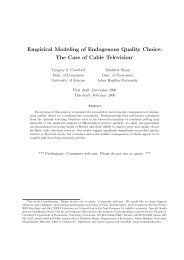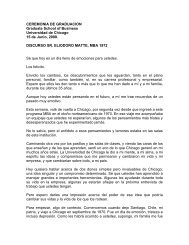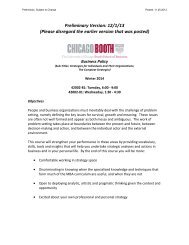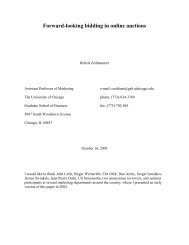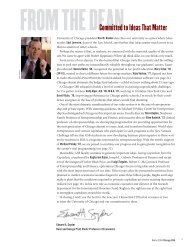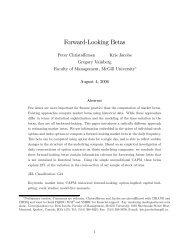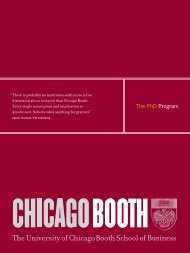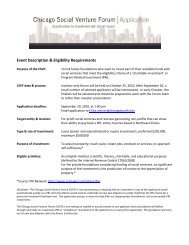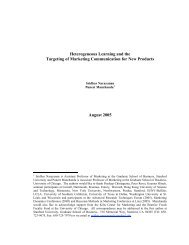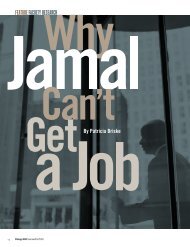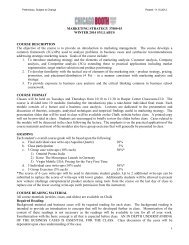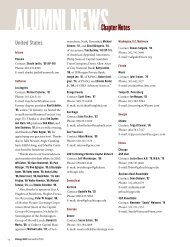Young-Kyu Kim - The University of Chicago Booth School of Business
Young-Kyu Kim - The University of Chicago Booth School of Business
Young-Kyu Kim - The University of Chicago Booth School of Business
Create successful ePaper yourself
Turn your PDF publications into a flip-book with our unique Google optimized e-Paper software.
E D U C A T I O NUNIVERSITY OF CHICAGO,GRADUATE SCHOOL OF BUSINESS<strong>Young</strong>-<strong>Kyu</strong> <strong>Kim</strong>575 W. Madison St. Apt. #3201, <strong>Chicago</strong>, IL 60661Tel: 312.575.8510; Mobile: 773.818.8433ykim8@<strong>Chicago</strong>GSB.eduPhD Candidate• Major area: Organizations and Markets• Support area: Econometrics• Coordinated Sequence: Sociology<strong>The</strong>sis Title: An Examination <strong>of</strong> Status Dynamics in the U.S. Venture Capital Industry<strong>The</strong>sis Committee: Pr<strong>of</strong>essors Matthew Bothner (Chair), Ronald Burt, Timothy Conley,Stanislav Dobrev, Damon Phillips, and Sean SaffordMBA, expected in 20082002 - presentCARNEGIE MELLON UNIVERSITY August 2002Master <strong>of</strong> Information Systems Management (with Distinction)SEOUL NATIONAL UNIVERSITY February 1996Master <strong>of</strong> <strong>Business</strong> Administration (with Honors)• Concentration: International <strong>Business</strong>/ Strategic ManagementSEOUL NATIONAL UNIVERSITY February 1994Bachelor <strong>of</strong> <strong>Business</strong> Administration (with Honors)RESEARCH INTERESTSOrganizational identity and status, and their impacts on market competition; optimal social structure<strong>of</strong> entrepreneurship; the effect <strong>of</strong> social environment on individual motivation, incentive, andperformance; the effect <strong>of</strong> syndicate network in the U.S. venture capital industryHONORS AND AWARDS• Oscar Mayer Fellowship; the Oscar Mayer Foundation (2006 – present)• PhD Studies Fellowship; GSB, <strong>University</strong> <strong>of</strong> <strong>Chicago</strong> (2002 – present)• <strong>The</strong> Best Researcher <strong>of</strong> the Year; Korea Information Society Development Inst. (2000)• Dongwon Fellowship; Dongwon Educational Foundation (1995)• <strong>The</strong> 1 st member <strong>of</strong> LG 21 st Century Global Interactive Challengers (1995)• Institute <strong>of</strong> International <strong>Business</strong> and Strategy Fellowship (1994)• Dean's List (1991 – 1993)• Chung-Dong High <strong>School</strong> Alumni Association Fellowship (1990)
W O R K E X P E R I E N C EUNIVERSITY OF CHICAGO,GRADUATE SCHOOL OF BUSINESS2002 – presentTeaching Assistant• Strategy and Structure (Pr<strong>of</strong>essor Matthew Bothner; 2006 – 2007)• Strategic Leadership in Uncertain Environment (Pr<strong>of</strong>essor Sean Safford; 2006 – 2007)• Network Structures <strong>of</strong> Effective Management (Pr<strong>of</strong>essor Damon Phillips; 2003 – 2005)Research Assistant• Have worked with Pr<strong>of</strong>essors Matthew Bothner, Damon Phillips, and Valery YakubovichKOREA INFORMATION SOCIETY DEVELOPMENT INSTITUTEMANAGEMENT CONSULTING DIVISION1997 – 2001Senior Researcher (Associate level)• Created and proposed various strategies and measures to enhance Korea Postal Service andKorea Telecom’s competitive position.• As a delegate <strong>of</strong> Korea Information Society Development Institute, participated in the 1st and2nd Cooperative Workshop for the Development <strong>of</strong> Postal Services between Korea and China inSeoul, Korea and in Beijing, China (2000).• Conducted consulting projects with Stanford Research Institute (1998), <strong>University</strong> <strong>of</strong> Michigan(1999), Arthur D. Little (1999), Oracle (1999), Ovum (2000), etc.MINISTRY OF INFORMATION AND COMMUNICATIONS 1996 – 1997Public Service Agent (in lieu <strong>of</strong> mandatory army service)THE IBS CONSULTING GROUP 1996Consultant• Long-Term Strategic Planning <strong>of</strong> Korea Trade and Investment Promotion AgencySEOUL NATIONAL UNIVERSITYINSTITUTE OF MANAGEMENT RESEARCHResearch Assistant <strong>of</strong> the Case Development Center• Published Case Study Indexes for Seoul National <strong>University</strong>Participated in the following projects as a research assistant• Long-term Strategic Planning <strong>of</strong> Korea Highway Corporation (1995)• Strategy Audit <strong>of</strong> Korea Telecom (Ⅱ): Corporate Governance Structure (1995)• Strategy Audit <strong>of</strong> Korea Telecom (Ⅰ): <strong>Business</strong> Strategy and Privatization (1994)• Strategy for Technology Innovation in the Korean Semiconductor Industry (1994)1994 - 1996
RESEARCHDISSERTATIONAn Examination <strong>of</strong> Status Dynamics in the U. S. Venture Capital IndustryAbstract: I explore a dynamic relationship between the two kinds <strong>of</strong> status - primary status and complementarystatus. Primary status indicates a producer’s quality as a leader while complementary status approximates aproducer’s quality as an admired follower. To model the dynamics, I apply a spatial panel vectorautoregression approach, which accounts for social distance between actors, to venture capital industry. Myfindings include (1) both kinds <strong>of</strong> status Granger cause each other; (2) the return to status depends on the level<strong>of</strong> status; and (3) a sufficiently big change in status may have persistent impacts. My research is expected tocarry implications on organizational status decay as well as growth.Status Membership as Another Dimension <strong>of</strong> Identity: <strong>The</strong> Effect <strong>of</strong> Status Variance on the FutureOrganizational StatusAbstract: In this article, I introduce an additional dimension <strong>of</strong> organizational identity from the viewpoint <strong>of</strong>market audience. Under the uncertain situation, market audience socially identifies organizations by theirniche or relations with other organizations. My research deals with the relations with other organizations as away for market to identify organizations, especially focusing on status variance. In this paper, I define statusvariance as the degree <strong>of</strong> dispersion between alters’ status for an ego and explore the effect <strong>of</strong> status varianceon status growth. On the one had, broader spectrum <strong>of</strong> alters’ status may bring the same benefit as brokerage– various types <strong>of</strong> information and different kinds <strong>of</strong> skills, for example. On the other hand, such benefit maybe <strong>of</strong>fset by increasing ambiguity in market’s identification <strong>of</strong> ego’s status. Using both legal/financial advisorynetworks in the market <strong>of</strong> mergers and acquisition as well as venture capitalists’ network, I find evidence forthe argument that high status variance affects future status growth negatively.WORKING PAPER – provisional acceptance at Organization ScienceWhy Pseudonyms? Deception as Identity Preservation among Jazz Record Companies, 1920 – 1929(with Damon J. Phillips)Abstract: This paper theoretically and empirically engages the relationship between organizational identity anddeception using the market for early jazz recordings as a setting. In this setting pseudonyms (where arecording is reissued under a fictitious name) were used deceptively as a way to preserve a firm’s identitywhile selling pr<strong>of</strong>itable but identity-threatening products to the mass market. Firms founded in the Victorian-Era actively sought alignment with the cultural elite and used pseudonyms to deceive observers into believingthat their production <strong>of</strong> cultural products was consistent with their Victorian-Era identity. In effect,pseudonyms allowed these firms to decouple their position in identity space from their position in productspace by inflating production <strong>of</strong> identity-preserving products. Using product data from jazz discographies,record company directories, and record advertisements in major U.S. newspapers, we provide strong empiricalevidence that Victorian-Era firms were active in using pseudonyms to preserve their identities even while theseacts were inconsistent with a pursuit <strong>of</strong> financial gain.
WORKING PAPERS – in preparation for submissionBrokerage as a Magnifying Glass: <strong>The</strong> effect <strong>of</strong> brokerage on status growthAbstract: This article explores the question <strong>of</strong> “what kind <strong>of</strong> social capital is optimal for growth in status.”This article starts with reviews <strong>of</strong> two divergent views on network property as a form <strong>of</strong> social capital: closurevs. brokerage. By considering interaction between structural holes and status, this article reconciles twodivergent views. Specifically, this article claims that brokerage has a positive effect on high-status firms butdoes not have a positive effect on low-status firms. In line with Burt’s “magnifying glass” metaphor, thisarticle predicts that the positive effect <strong>of</strong> brokerage will become greater as organizational status gets higher.<strong>The</strong> main proposition <strong>of</strong> this article is supported by empirical analysis on venture capital industry from 1975 to2003, using fixed-effect model as well as alternative model specification. <strong>The</strong> finding <strong>of</strong> this article has animplication on not only organizational sociology literature but also broad status attainment research.Specifically, as a strategic behavior to gain status, this article suggests that an actor should position in cohesivenetwork initially and that an actor should increase the level <strong>of</strong> brokerage as status grows.Primary Status, Complementary Status, and Capital Acquisition in the U.S. Venture Capital Industry(with Matthew S. Bothner and Wonjae Lee)Abstract: This article introduces a distinction between two kinds <strong>of</strong> status—primary status and complementarystatus. Using as our starting point the documented finding that status positively affects economic performance,we extend earlier work on status-based competition by exploiting the fact that producers simultaneouslyoccupy positions in multiple prestige-based hierarchies, in turn signaling their distinct abilities to performdifferent roles in the same market—namely, the roles <strong>of</strong> leader and follower, originator and complementor, starand supporter in the context <strong>of</strong> syndicate-like structures. In light <strong>of</strong> these distinct roles, we view primarystatus as an indicator <strong>of</strong> a producer’s quality as a leader and complementary status as an indicator <strong>of</strong> aproducer’s quality as a follower. Using a multi-year panel <strong>of</strong> data on the rate at which VC firms grow in thenumber <strong>of</strong> funds they raise, we find that primary and complementary status independently and positively affectfuture performance.How Does Status Affect Inertia? <strong>The</strong> Effects <strong>of</strong> Primary and Complementary Status onOrganizational Change (with Matthew S. Bothner and Wonjae Lee)Abstract: What is the effect <strong>of</strong> status on organizational inertia? Does greater status impede change? Or does itinstead make organizations more prone to shift their market positions? Two competing hypotheses find supportin the literature: (i) Higher status economic actors are thought to be decidedly less change-prone. According tothis view, status is an asset to be deliberately protected by staying in place, and occupancy <strong>of</strong> a privilegedlocation in a prestige ordering insulates from the competitive pressure that otherwise triggers structural andstrategic shifts. (ii) A second set <strong>of</strong> accounts underlies the equally plausible expectation that status amplifies agiven organization's propensity to reposition itself. Underpinning this alternative view are the possibilities thathigher status producers at once see more opportunities for change and can pursue them at lower cost than theirless-well-regarded counterparts. Which <strong>of</strong> these perspectives more accurately depicts organizational conduct?We address this question by elucidating and contrasting these opposing views before taking steps towardtheoretical resolution in multidimensional model <strong>of</strong> status. In particular, we introduce a distinction betweentwo kinds <strong>of</strong> status—primary status and complementary status—exploiting the fact that producerssimultaneously occupy positions in multiple prestige-based hierarchies, in turn signaling their distinct abilitiesto perform different roles in the same market—namely, the roles <strong>of</strong> leader and follower, originator andcomplementor, star and supporter in the context <strong>of</strong> syndicate-like structures. In light <strong>of</strong> these distinct roles, weview primary status as an indicator <strong>of</strong> a producer’s quality as a leader and complementary status as anindicator <strong>of</strong> a producer’s quality as a follower. Using a multi-year panel <strong>of</strong> data on the degree to which VCchange their investment strategies, we find that primary and complementary status differentially affectorganizational inertia. Complementary status renders firms more inert. And as long as complementary status ishigh, primary status positively affects strategic change.
How Does Status Affect Performance? Status as an Asset Versus Status as a Liability in the PGA andNASCAR (with Matthew S. Bothner and Edward Smith)Abstract: Two competing predictions about the effect <strong>of</strong> status on performance appear in the organizationaltheory and sociological literatures. On the one hand, various researchers have repeatedly posited that statuselevates levels <strong>of</strong> performance. This line <strong>of</strong> work emphasizes performance-related tangible and intangibleresources that accrue to occupants <strong>of</strong> high status positions, thus picturing status as an asset. On the otherhand, a second line <strong>of</strong> work emphasizes complacency and distraction as the deleterious byproducts <strong>of</strong>achieving high status, thus portraying status as a liability. Which <strong>of</strong> these two approaches best characterizesthe actual performance <strong>of</strong> individuals in a market setting? And are these views in any way reconcilable? Inthis article, we summarize the two views and then test them in two empirical settings: the Pr<strong>of</strong>essional GolfAssociation (PGA) and the National Association for Stock Car Racing (NASCAR). Using panel data fromboth empirical settings we model athletes’ performance as a function <strong>of</strong> their status in the sport and findprecisely the same curvilinear effect <strong>of</strong> status in both settings. Performance improves with status—until a veryhigh level <strong>of</strong> status is reached, after which performance wanes. This result is consistent not only with theview that status carries tangible and intangible resources, but also, and more importantly, provides empiricalsupport for the contention that status eventually fosters dispositions and modes <strong>of</strong> conduct that undermineperformanceCONFERENCE PRESENTATIONS2007 Annual Meeting <strong>of</strong> the ACADEMY OF MANAGEMENTAn Examination <strong>of</strong> Status Dynamics in the U. S. Venture Capital Industry2006 Annual Meeting <strong>of</strong> the ACADEMY OF MANAGEMENTPrimary Status, Complementary Status, and Capital Acquisition in the U.S. Venture CapitalIndustry (with Matthew S. Bothner and Wonjae Lee)2006 Annual Meeting <strong>of</strong> the AMERICAN SOCIOLOGICAL ASSOCIATIONHow Does Status Affect Inertia? <strong>The</strong> Effects <strong>of</strong> Primary and Complementary Status onOrganizational Change (with Matthew S. Bothner and Wonjae Lee)2005 Annual Meeting <strong>of</strong> the ACADEMY OF MANAGEMENTLegitimate Deception: Pseudonyms as Legitimate Product Offerings among Jazz RecordCompanies, 1920-1929 (with Damon J. Phillips)2005 Trans-Atlantic Conference in London <strong>Business</strong> <strong>School</strong>Brokerage as a Magnifying Glass: <strong>The</strong> Effect <strong>of</strong> Brokerage on Status Growth1996 Annual Meeting <strong>of</strong> the ACADEMY OF INTERNATIONAL BUSINESSEmpirical Study on Life Cycle Model <strong>of</strong> National Competitiveness: <strong>The</strong> Case <strong>of</strong> Korea (withDong-Sung Cho and Dong-hyun Lee)
MISCELLANEOUSPOSTAL INFORMATION REVIEW Articles (Korean)Value Creation in Postal <strong>Business</strong> through New Customer Relations (2001);Exploring New Strategic Concept for the Korea Postal Service: In the View <strong>of</strong> ValueCreation/Innovation (2000); <strong>The</strong> Change <strong>of</strong> Postal Service's Value Chain in the InformationEra (1999); An Introduction <strong>of</strong> Electronic Commerce for Acquiring Competitive Advantage(1999); A Study on Postal Reform: <strong>The</strong> Determinants <strong>of</strong> Governance (1999)INFORMATION AND COMMUNICATION (Magazine Article, in Korea)Recommendation <strong>of</strong> Door-to-Door Courier Services for Korea Postal Service (1999)PROFESSIONAL AFFILIATIONAcademy <strong>of</strong> Management; American Sociological Association
REFERENCE (available upon request)Matthew S. BothnerAssociate Pr<strong>of</strong>essor <strong>of</strong> Organizations andStrategyGraduate <strong>School</strong> <strong>of</strong> <strong>Business</strong><strong>University</strong> <strong>of</strong> <strong>Chicago</strong>5807 South Woodlawn Avenue<strong>Chicago</strong>, IL 60637Email: matthew.bothner@chicagogsb.eduPhone: (773) 834-5953Stanislav D. DobrevAssociate Pr<strong>of</strong>essor <strong>of</strong> Organizations andStrategyGraduate <strong>School</strong> <strong>of</strong> <strong>Business</strong><strong>University</strong> <strong>of</strong> <strong>Chicago</strong>5807 South Woodlawn Avenue<strong>Chicago</strong>, IL 60637Email: stanislav.dobrev@chicagogsb.eduPhone: (773) 834-5965Damon J. PhillipsPr<strong>of</strong>essor <strong>of</strong> Organizations and Strategy andNeubauer Family Faculty FellowGraduate <strong>School</strong> <strong>of</strong> <strong>Business</strong><strong>University</strong> <strong>of</strong> <strong>Chicago</strong>5807 South Woodlawn Avenue<strong>Chicago</strong>, IL 60637Email: damon.phillips@chicagogsb.eduPhone: (773) 834-2863



